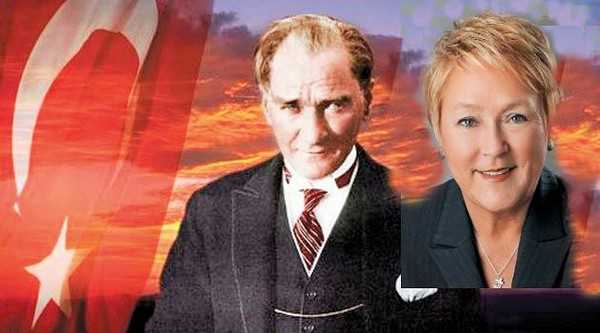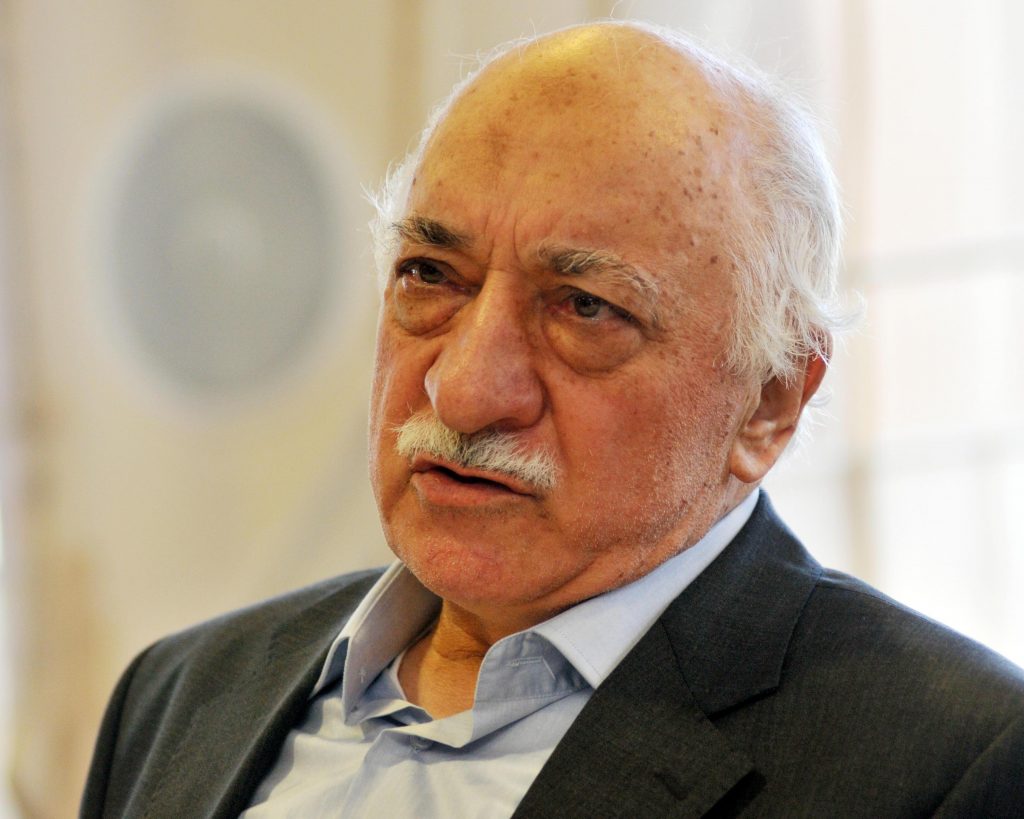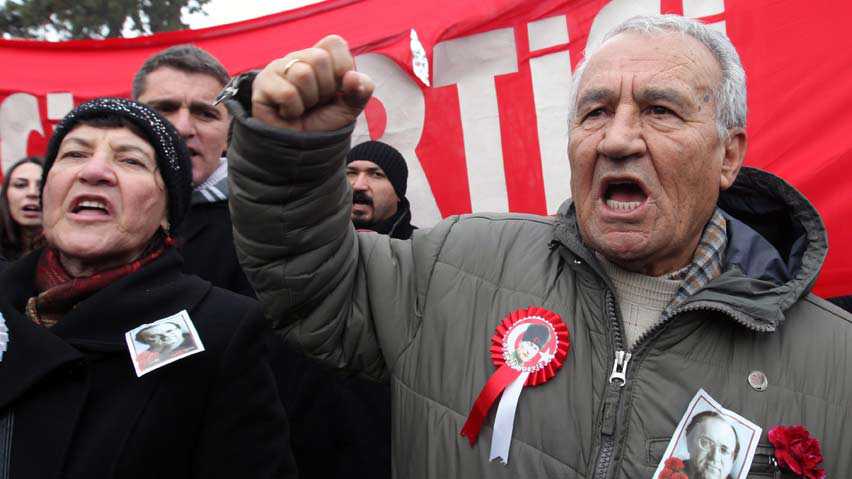Angelia
CanadianFreePress
Fethullah Gulen, allegedly “the most dangerous Islamist on planet earth,” is alive, well, and living in Pennsylvania with over $25 billion in financial assets.
From Pennsylvania, he has toppled the secular government of Turkey, established over 3,000 schools throughout Central Asia, the Middle East, Europe, and the United States, created a new country called East Turkistan, and formed a movement that seeks to create a New Islamic World Order.
This reporter made a recent visit to Gulen’s 28-acre mountain complex at 1857 Mt. Eaton Road in Saylorsburg, PA – – the very heart of the Pocono Mountains.
The complex consists of a massive chalet that is surrounded by numerous out buildings, including recreational centers, dormitories, and cabins for visiting foreign dignitaries. The property also contains a large pond, a helicopter pad, and, reportedly, firing ranges.
The first floor of the chalet contains a dining hall capable of serving a small army. The second floor is an open area with a library, computer station, and open areas with divans where disciples pour over Turkish newspapers, Islamic texts, and the collected wisdom of their Hocaefendi (“religious master”). Gulen himself resides on the third floor and rarely emerges to meet with his followers, let alone inquisitive reporters.
The road leading into the complex is blocked by a metal gate and a sentry hut.Inside the Gulen Compound
A visit to the Pennsylvania fortress of “The World’s most Dangerous Islamist”
Share38 | Bookmark and Share | (0) Comments | Subscribe | Print friendly | Contact Us
– Dr. Paul L. Williams Monday, April 4, 2011
imageFethullah Gulen, allegedly “the most dangerous Islamist on planet earth,” is alive, well, and living in Pennsylvania with over $25 billion in financial assets.
From Pennsylvania, he has toppled the secular government of Turkey, established over 3,000 schools throughout Central Asia, the Middle East, Europe, and the United States, created a new country called East Turkistan, and formed a movement that seeks to create a New Islamic World Order.
This reporter made a recent visit to Gulen’s 28-acre mountain complex at 1857 Mt. Eaton Road in Saylorsburg, PA – – the very heart of the Pocono Mountains.
The complex consists of a massive chalet that is surrounded by numerous out buildings, including recreational centers, dormitories, and cabins for visiting foreign dignitaries. The property also contains a large pond, a helicopter pad, and, reportedly, firing ranges.
The first floor of the chalet contains a dining hall capable of serving a small army. The second floor is an open area with a library, computer station, and open areas with divans where disciples pour over Turkish newspapers, Islamic texts, and the collected wisdom of their Hocaefendi (“religious master”). Gulen himself resides on the third floor and rarely emerges to meet with his followers, let alone inquisitive reporters.
The road leading into the complex is blocked by a metal gate and a sentry hut.
imageWithin the hut are high definition televisions that flash images from the security cameras that have been strategically placed throughout the complex. The post is manned day and night by Turkish guards, who speak little or no English.
Before the hut is a sign that reads “Golden Generation Worship and Retreat Center.” No visitor in his or her right mind could believe that the tiny, one room building serves as a house of worship, let alone a place for a weekend retreat. The building contains only a metal desk, two straight chairs, the monitors, and the sentries who, upon the occasion of this reporter’s visit, offered no word of welcome but instead called upon other members of the complex to escort this reporter and his photographer sidekick from the premises.
The neighbors complained to this reporter of gunfire from fully automatic weapons coming from the complex and the presence of a surveillance helicopter that combs the property in search of unwanted intruders.
They maintain that an army of approximately 100 Turkish guards stand watch over the property in order to protect their reclusive leader.
Combing the parameters of the property, one can easily spot the guards. They wear suits, white shirts, and ties and do not look like traditional Islamists in cloaks and turbans.
According to a source within the compound, the guards and other members of the compound follow their Hocaefendi’s orders without question and refrain from marrying until age fifty per his instructions. When they do marry, the spouses are expected to dress in the Islamic manner, as dictated by Gülen himself.
The women do not live within the complex but rather in modest houses along Mt. Eton Road.
Little about Gulen, as U.S. Attorney Patrick Meehan discovered, is known – – not even his date of birth. Some of his followers maintain that he was born in 1934; others 1938; and still others 1942.
How dangerous is Gulen?
In his public statements, Gulen espouses a liberal version of Sunni/Hanafi Islam and promotes the Muslim notion of hizmet – – altruistic service to the common good.
Despite the presence of the armed guards at his Pocono fortress, Gulen has condemned terrorism and called for interfaith dialogue. He claims to have met with Pope John Paul II, the Greek Orthodox Patriarch Bartholomeos, and Israeli Sephardic Head Rabbi Eliyahu Bakshi-Doron.
Whether these meetings with Christian and Jewish leaders actually occurred is questionable. On his website, Gulen says that he has a UNECO award from Pope John Paul II in October, 2005. John Paul II died on April 2, 2005.
In private, Gulen has stated that “in order to reach the ideal Muslim society every method and path is acceptable, [including] lying to people.”
In a sermon that was aired on Turkish television, Gulen said:
You must move in the arteries of the system without anyone noticing your existence until you reach all the power centers … until the conditions are ripe, they [the followers] must continue like this. If they do something prematurely, the world will crush our heads, and Muslims will suffer everywhere, like in the tragedies in Algeria, like in 1982 [in] Syria … like in the yearly disasters and tragedies in Egypt. The time is not yet right. You must wait for the time when you are complete and conditions are ripe, until we can shoulder the entire world and carry it … You must wait until such time as you have gotten all the state power, until you have brought to your side all the power of the constitutional institutions in Turkey … Until that time, any step taken would be too early—like breaking an egg without waiting the full forty days for it to hatch. It would be like killing the chick inside. The work to be done is [in] confronting the world. Now, I have expressed my feelings and thoughts to you all—in confidence … trusting your loyalty and secrecy. I know that when you leave here—[just] as you discard your empty juice boxes, you must discard the thoughts and the feelings that I expressed here.
Under the AKP, Turkey has become a militant Islamic state, transferring its alliance from Europe and the United States to Russia and Iran
Anyone doubting the incredible power wielded by Gulen need only take note of the achievements of the Justice and Development Party (Adalet ve Kalkinma, AKP)- – a party Gulen formed this party as soon as he arrived in Pennsylvania. By 2003, the AKP became the governing party in Turkey and a powerful force throughout the Muslim world. Abdullah Gul, Turkey’s first Islamist President, is a Gulen disciple, along with Prime Minister Recep Tayyip Erdogan and Yusuf Ziya Ozcan, the head of Turkey’s Council of Higher Education.
Under the AKP, Turkey has become a militant Islamic state, transferring its alliance from Europe and the United States to Russia and Iran. It has moved toward friendship with Hamas, Hezbollah, and Syria and created a pervasive anti-Christian, anti-Jewish, and anti-America animus throughout the populace.
Speaking at the inauguration ceremony of “TRT al Turkiye”, the new channel of the state run TV station TRT, Prime Minister Erdogan said Turkey will always be on the side of Muslims wherever they are.
Within Turkey, Gulen also formed a vast conglomerate called Kaynak Holding, which today includes some 15 companies involved in the retail, I.T., construction, and food industries. The main division, Kaynak Publishing, maintains 28 publishing labels. It produces hundreds of books per year on and by Gülen, in addition to books on the glories of the Ottoman Empire and the achievements of militant Islam.
Gulen also owns Feza Media Group, which publishes the Today’s Zaman (Turkey’s leading daily newspaper) and the magazine Aksiyon. A subsidiary of Feza is Samanyolu Broadcasting, which operates most of Turkey’s TV stations. Gulen and his followers also control Bank Asya, now Turkey’s largest Islamic bank, with billions of dollars in assets, and TUSKON, a Turkish businessmen’s association, with 50,000 companies as members.
With his vast resources, Gulen established thousands of schools throughout Central Asia – – – Uzbekistan, Kazakhstan, Kyrgyzstan, Turkmenistan, and Azerbaijan – – in order to create a massive pan-Islamic state. Noted whistleblower Sibel Edmonds explains: “Turkey shares the same heritage/race as the entire population of Central Asia, the same language (Turkic), the same religion (Sunni Islam), and of course, the strategic location and proximity.”
According to Bayram Balci, a Turkish scholar, the Gulen schools seek to expand “the Islamization of Turkish nationality and the Turification of Islam” in order to bring about a universal caliphate ruled by Islamic law.
Because of the subversive nature of these institutions, these schools have been outlawed in Russia and Uzbekistan.
Even the Netherlands, a nation that embraces pluralism and tolerance, has opted to cut funding to the Gulen schools because of their imminent threat to the social order.
But Gulen’s 150-plus charter schools in the United States, which advance Gulen’s international agenda have received little national attention.
All of these charter schools – – which advance the New Islamic World Order – – are fully funded by American taxpayers.
A partial listing of the Gulen schools throughout the U.S.A.
Arizona
Schools Operated by Daisy Education Corporation
* Sonorant Science Academy-Tucson Middle-High School 2325 W Sunset Rd., Tucson
* Sonorant Science Academy-Tucson Elementary School 2325 W Sunset Rd., Tucson
* Sonorant Science Academy-Broadway Kindergarten – Grade 8, 6880 E Broadway Blvd., Tucson
* Sonoran Science Academy-Phoenix Kindergarten – Grade 10 4837 E McDowell Rd., Phoenix
* Daisy Early Learning Academy, 2325 W Sunset Rd., Tucson, AZ
* Davis Monthan Air Force Base
Arkansas
* Lisa Academy 21 Corporate Hill Dr., Little Rock
* Lisa Academy-North 5410 Landers Rd, Sherwood
California
* Magnolia Science Academy 1, 18238 Sherman Way, Reseda
* Magnolia Science Academy 2, 18425 Kittridge St., Reseda
* Magnolia Science Academy 3, 1444 W Rosecrans Ave., Gardena
* Magnolia Science Academy 4, 1010 Abbot Kinney Blvd, Venice, CA
* Magnolia Science Academy 5, 1530 N Wilton Place, Hollywood
* Magnolia Science Academy 6, San Carlos
* Momentum Middle School, 6365 Lake Atlin, San Diego
* Bay Area Technology School (Bay Tech) 4521 Webster St., Oakland
* Pacific Technology School-San Juan
* Pacific Technology School-Santa Ana
Colorado
* Lotus School for Excellence, Aurora
Florida
* Orlando Science Middle School, 2427 Lynx Lane, Orlando
* River City Science Academy, 3266 Southside Blvd., Jacksonville
* Sweet water Branch Academy 1000 NE 16th Ave, Building C, Gainesville
* Stars Middle School 1234 Blountstown Highway, Tallahassee
Georgia
* Fulton Science Academy Middle School, 1675 Hembree Road, Alpharetta
* Technology Enriched Accelerated Charter High School, 4100 Old Milton Pkwy, Alpharetta
Illinois
* Science Academy of Chicago, Grade 1-Grade 8, 8350 N. Greenwood Ave, Niles
* Chicago Math and Science Academy Secondary School, 1705 West Lunt Ave, Chicago
Indiana
Operated by Concept Schools, Inc.
* Indiana Math and Science Academy, Grade 6-Grade 12, 4575 W 38th Street, Indianapolis
Louisiana
* Abramson Science and Technology 5552 Read Blvd., New Orleans
Maryland
* Chesapeake Science Point Secondary School 1321 Mercedes Drive, Hanover
Massachusetts
* Pioneer Charter School of Science Grade 7- Grade 10, 51-59 Summer Street, Everett
Missouri
* Broadside-Frontier Math and Science School Secondary School, 5605 Troost, Kansas City
* Broadside Charter and Day School Elementary School, 5220 Troost Ave., Kansas City
Nevada
* Coral Academy of Science-Las Vegas, 8185 Tamarus St., Las Vegas
* Coral Academy of Science-Reno Secondary School, 1350 East Ninth Street, Reno
* Coral Academy of Science- Reno Elementary School, 1701 Valley Road, Reno
New Jersey
* Bergen Arts and Science Charter School, K-8, 200 MacArthur Ave, Garfield
* Paterson Charter School for Science and Technology, 276 Wabash Ave., Paterson
* Tuition Schools
* Pioneer Academy of Science, K-12, 366 Clifton Avenue, Clifton
Ohio
Operated by Concept Schools, Inc.
* Horizon Science Academy-Cincinnati Middle School-High School, 1055 Laidlaw Avenue, Cincinnati
* Horizon Science Academy-Cleveland High School, 6000 South Marginal Rd., Cleveland
* Horizon Science Academy-Cleveland Middle School, 6100 South Marginal Rd. Cleveland
* Horizon Science Academy-Cleveland Elementary School, 6150 South Marginal Rd. Cleveland
* Horizon Science Academy-Columbus High School 1070 Morse Rd. Columbus
* Horizon Science Academy-Columbus Middle School 1341 Bethele Road, Columbus
* Horizon Science Academy-Columbus Elementary School, 2835 Morse Rd., Columbus
* Horizon Science Academy-Dayton, 545 Odlin Ave., Dayton
* Horizon Science Academy – Denison, K-1, Grades 4 – 8, 1700 Denison Avenue, Cleveland
* Horizon Science Academy – Springfield, Grades 5- 8 630 South Reynolds Road, Toledo, OH 43615-6314
* Horizon Science Academy – Toledo, Toledo High School, 425 Jefferson Avenue, Toledo
* Noble Academy-Columbus, K-Grade 8, 1329 Bethel Road, Columbus
* Noble Academy-Cleveland 1200 E. 200th Street, Euclid
Oklahoma
Schools operated under the Cosmos Foundation, TX.
* Dove Science Academy-OKC Secondary School, 919 NW 23rd St., Oklahoma City
* Dove Science Academy-OKC Elementary School, 4901 N Lincoln Blvd., Oklahoma City
* Dove Science Academy-Tulsa, 280 S Memorial Dr, Tulsa
Tuition school affiliated with Raindrop Turkish House
* Bluebonnet Learning Center of Tulsa Nursery, Pre-School and Pre-Kinder Education, 280 S Memorial Dr., Tulsa
Pennsylvania
* Truebright Science Academy Secondary School, 926 West Sedgley Avenue, Philadelphia
* Snowdrop Science Academy Pre-School – Grade 7, 233 Seaman Lane, Monroeville
Texas
Operated by The Cosmos Foundation
* Harmony Science Academy-Austin Secondary School, 930 East Rundberg Lane, Austin
* Harmony School of Science-Austin Kindergarten- Grade 8, 11800 Stonehollow Drive, Suite 100, Austin
* Harmony Science Academy-North Austin, Grades 6- 10, 1421 Wells Branch Parkway, W Suite 200, Pflugerville
* Harmony Science Academy-Beaumont, Kindergarten- Grade 10, 4055 Calder Ave, Beaumont
* Harmony Science Academy-Brownsville
* Harmony Science Academy-Bryan/ College Station
* Harmony Science Academy-Dallas Secondary School, 11995 Forestgate Dr., Dallas
* Harmony Science Academy-Dallas Elementary School, 11995 Forestgate Dr., Dallas
* Harmony Science Academy- El Paso, 9405 Betel Dr., El Paso
* Harmony Science Academy-Fort Worth
* Harmony Science Academy-Grand Prairie, 1102 NW 7th St, Grand Prairie
* Harmony Science Academy-Houston Secondary School, 5435 S. Braeswood, Houston
* Harmony School of Excellence-Houston, Elementary and Secondary School, 7340 North Gessner Rd, Houston
* Harmony School of Innovation-Houston, 9421 West Sam Houston Parkway, South Houston
* Harmony School of Science-Houston, 13415 W Belford Ave., Sugar Land
* Harmony Science Academy-Northwest, Kindergarten- Grade 10, 16200 Tomball Parkway, Houston
* Harmony Science Academy-Laredo, 4401 San Francisco Avenue, Laredo
* Harmony Science Academy-Lubbock, 1516 53rd Street, Lubbock
* Harmony Science Academy-San Antonio, 8505 Lakeside Parkway, San Antonio
* Harmony Science Academy-Waco, 1900 N. Valley Mills Dr., Waco
* Texas Gulf Institute Career Center Adult Education, 9431 W Sam Houston Pkwy., S #203, Houston
Operated by Riverwalk Education Foundation, Inc
* School of Science and Technology Discovery, K-12, 5707 Bandera Road, Leon Valley
* School of Science and Technology-San Antonio Secondary School, 1450 NE Loop 410, San Antonio
* School of Science and Technology-Corpus Christi
Tuition schools affiliated with Raindrop Turkish House
* Bluebonnet Learning Center of Houston Nursery, Pre-School and Pre-Kinder
* Education, 9303 W Sam Houston Parkway South, Suite 200, Houston
* Bluebonnet Learning Center of Dallas Nursery, Pre-School and Pre-Kinder Education, 1416 E Collins Blvd., Richardson
* Bluebonnet Learning Center of El Paso Nursery, Pre-School and Pre-Kinder Education 9405 Betel Dr., El Paso
Utah
* Beehive Science and Technology Academy, Secondary School, 1011 Murray Holiday Rd., Salt Lake City
Wisconsin
* Wisconsin Career Academy Middle-High School, 4801 S 2nd Street, Milwaukee






